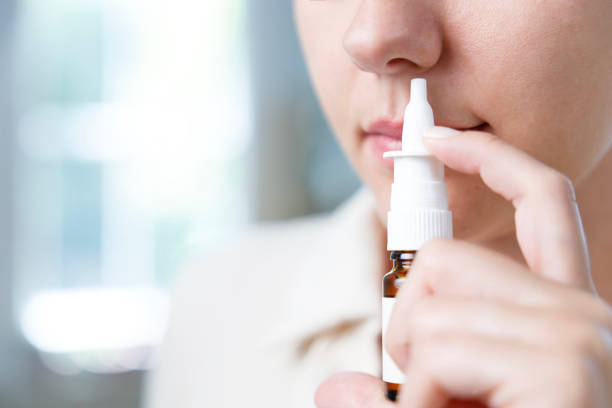USP Inhalation Product Delivered Dose Testing
The United States Pharmacopeia (USP) Inhalation Products—Delivered Dose Determinations chapter is a critical standard that ensures the accuracy and consistency of delivered dose in aerosol, metered-dose inhaler (MDI), and nasal products. This service plays an essential role in pharmaceutical manufacturing by validating that each unit provides consistent drug delivery to patients.
The USP 601 guidelines are designed for inhalation products containing propellants or pressurized containers as well as those without such features, including nebulizers. The goal is to ensure the delivered dose of active pharmaceutical ingredients (APIs) is within specified limits, which guarantees that patients receive accurate dosing.
Our laboratory uses advanced instruments like the Berger 304, TSI Side Stream Aerosol Sampler, and SPI 7800 to measure the delivered dose. These devices are calibrated according to ISO 22610:2011, ensuring precise and reliable results. The process involves sampling the aerosol from the device under test (DUT) and analyzing it in a controlled environment.
The methodology begins with a thorough review of the product specifications and USP guidelines. This ensures that all relevant parameters are considered during testing. Specimen preparation typically involves assembling the inhalation or nasal product according to standard operating procedures. The DUT is then placed into a sampling chamber, where it releases aerosolized particles.
Aerosol concentration measurements are taken using laser diffraction technology and particle sizing techniques. This data provides insights into the size distribution of particles inhaled by patients. The delivered dose is calculated based on these measurements and compared against USP limits. Acceptance criteria vary depending on the product type, but generally, they ensure that the delivered dose does not deviate significantly from labeled amounts.
Our team also performs additional tests to assess particle uniformity and stability. Particle uniformity ensures that all units within a batch produce consistent results, while stability checks verify that the product maintains its quality over time. These complementary tests further enhance the reliability of our services by ensuring comprehensive coverage of potential issues.
The importance of this testing cannot be overstated. Inaccurate dosing can lead to ineffective treatment outcomes or adverse reactions in patients. By adhering strictly to USP standards, we help manufacturers ensure their products meet regulatory requirements and provide safe, effective medications.
Our expertise extends beyond mere compliance; we strive to exceed expectations by providing detailed reports that go beyond simple pass/fail determinations. These reports include recommendations for improving product performance where necessary, helping our clients stay ahead of industry trends and regulations.
Scope and Methodology
The scope of USP inhalation product delivered dose testing encompasses a wide range of products including MDIs, nebulizers, and other aerosol delivery systems. The methodology involves several key steps to ensure accurate measurements:
1. Product Evaluation: We begin by reviewing the product specifications provided by the client. This step ensures that all relevant parameters are considered during testing.
2. Specimen Preparation: The inhalation or nasal product is assembled according to standard operating procedures. Careful attention is given to any specific instructions from the manufacturer regarding preparation.
3. Sampling and Analysis: Once prepared, the DUT is placed into a sampling chamber where it releases aerosolized particles. The concentration of these particles is then measured using advanced laser diffraction technology and particle sizing techniques. This data provides crucial insights into the size distribution of particles inhaled by patients.
4. Calculation and Comparison: The delivered dose is calculated based on the measured aerosol concentrations and compared against USP limits. Acceptance criteria vary depending on the product type, but generally, they ensure that the delivered dose does not deviate significantly from labeled amounts.
5. Additional Testing: To further enhance reliability, we also perform tests to assess particle uniformity and stability. Particle uniformity ensures consistent results across all units within a batch, while stability checks verify long-term quality maintenance.
Quality and Reliability Assurance
Our commitment to quality is reflected in our robust quality management system (QMS), which complies with ISO 9001:2015 standards. This ensures that all aspects of our testing process are meticulously documented, reviewed, and improved continuously.
Staff training is a cornerstone of our QMS. All technicians undergo rigorous certification programs to ensure they possess the necessary skills and knowledge for accurate and reliable testing. Regular audits conducted by external experts further reinforce these standards.
The use of calibrated instruments plays a pivotal role in maintaining high levels of accuracy. Our lab boasts state-of-the-art equipment, including the Berger 304, TSI Side Stream Aerosol Sampler, and SPI 7800. These devices are regularly recalibrated according to ISO 22610:2011 specifications. Calibration ensures that all measurements remain within acceptable tolerances, enhancing overall test reliability.
Data integrity is another critical aspect of our quality assurance process. All raw data collected during testing undergoes rigorous validation and verification before being included in final reports. This meticulous approach guarantees the accuracy and trustworthiness of every result produced by our laboratory.
In conclusion, our unwavering dedication to quality and reliability ensures that clients receive dependable test results that meet or exceed industry standards. Whether you're seeking basic compliance testing or detailed performance evaluations, we offer the expertise needed for successful product launches and ongoing improvements.
Environmental and Sustainability Contributions
Inhalation products, especially those used in respiratory care, have a significant impact on both human health and environmental sustainability. Our laboratory contributes positively to these areas by offering services that promote responsible manufacturing practices:
Emissions Reduction: By ensuring accurate dosing through rigorous testing, we help minimize overuse of medications, which reduces unnecessary emissions associated with their production.
Resource Efficiency: Precise dosing also leads to more efficient use of resources during manufacture. This efficiency translates into reduced waste and lower energy consumption throughout the supply chain.
Regulatory Compliance: Adherence to strict USP standards not only ensures product safety but also supports broader efforts towards environmental protection by promoting sustainable practices in pharmaceutical manufacturing.
We recognize that every small contribution adds up to make a significant difference. Through our dedication to quality and reliability, we aim to foster an industry where both people and the planet can thrive.





